新视野大学英语第三版第三册第四单元课文单词
- 格式:docx
- 大小:14.03 KB
- 文档页数:3
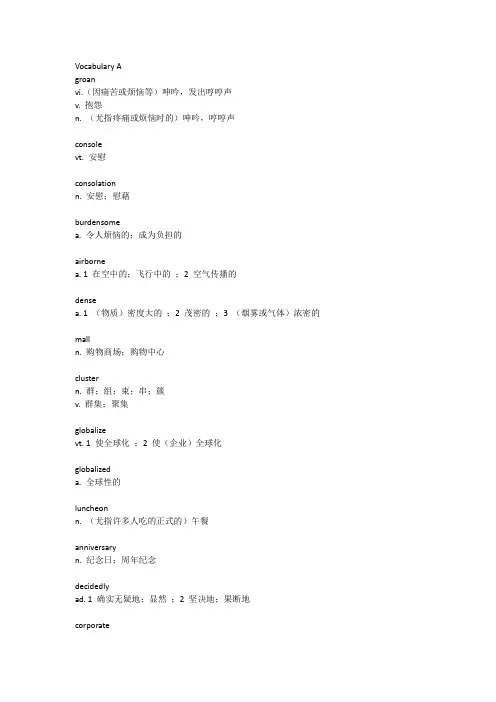
Vocabulary Agroanvi.(因痛苦或烦恼等)呻吟,发出哼哼声v. 抱怨n. (尤指疼痛或烦恼时的)呻吟,哼哼声consolevt. 安慰consolationn. 安慰;慰藉burdensomea. 令人烦恼的;成为负担的airbornea. 1 在空中的;飞行中的;2 空气传播的densea. 1 (物质)密度大的;2 茂密的;3 (烟雾或气体)浓密的malln. 购物商场;购物中心clustern. 群;组;束;串;簇v. 群集;聚集globalizevt. 1 使全球化;2 使(企业)全球化globalizeda. 全球性的luncheonn. (尤指许多人吃的正式的)午餐anniversaryn. 纪念日;周年纪念decidedlyad. 1 确实无疑地;显然;2 坚决地;果断地corporatea. 1 大公司的;2 全体的;集体的compulsorya. 必须做的;义务的;强制的offsetvt. 抵消;补偿n. 抵消物;补偿tropicala. 热带的;来自热带的aviationn. 航空;飞行(术)hemispheren. 1(地球的)半球;2 大脑半球ironyn. 1 具有讽刺意味的事;出乎意料的事;啼笑皆非的事;2 反语;反话;讥讽stubborna. 1 难以改变的;难以击败的;顽强的;2 (人)固执的,执拗的,倔强的contemplatev. 思忖;思量;仔细考虑vt. 盘算;打算saturatevt. 1 使充满;2 使湿透saturateda. 1 充满的;充斥的;2 湿透的;浸透的finitea. 有限的;有限制的literala. 1 缺乏想象力的;刻板的;2 字面意思的;原义的prosen. 散文(相对诗歌而言)versen. 1 (尤指遵循一定诗律的)诗(歌);2 诗句;诗节;(歌词的)节cognitivea. 认知的;认知过程的imprisonvt. 1 限制;束缚;2 关押;监禁mundanea. 1 普通的;平凡的;平淡无奇的;2 世俗的;尘世的exotica. 1 外国产的;外国来的;2 奇异的;别致的;异乎寻常的endowvt. 赋予;认为具有某种品质triviala. 没意思的;不严重的;没价值的;琐碎的multiculturala. 多元文化的;多种文化融合的ambiguityn. 模棱两可;不明确circumferencen. 1 周边;2 圆周;周长latituden. 纬度longituden. (地球的)经度renaissancen. 1 复兴;重新流行;2 (the R~)(欧洲14世纪至16世纪的)文艺复兴时期facetn. (情形或某人性格的)某一方面insulara. 与世隔绝的;思想狭隘的;固步自封的drawbackn. 不足;欠缺jet lagn. 飞行时差综合征;时差反应cornerstonen. 1 基础;根本;基石;2 奠基石on sale廉价出售的trade … for …用…交换… ;相互交换mingle … with使…与…混合be open to sth.愿意考虑…more often than not往往;多半Left Bank(巴黎的)左岸地区(位于塞纳河南岸)Machu Picchu马丘比丘(南美洲最重要的考古发掘中心,也是秘鲁最受欢迎的旅游景点)Vocabulary Bsoload. 单独地;独自地a. 单独的;独自的n. 独奏(曲);独唱(曲)aestheticsn.(审)美学fragranta. 香的;芬芳的venerablea. (因年纪、经验而)受人尊敬的,德高望重的;(因历史意义)神圣庄严的,珍贵的chunkn. 1 大量;大部分;2 厚块;大块locomotiven. 机车;火车头notationn. 系统成套的记号;音乐符号;数学符号onsetn.(尤指某种坏事情的)开始,发作zigzagvi. 曲折地行进n. 之字形;Z字形multinationala. 1(公司或商行)跨国的;2 多国的conceivevt. 1 想象;想出;2 构想;设想inconceivablea. 难以置信的recklessa. 轻率的;鲁莽的isolationn. 隔离;孤立;分离susceptiblea. 易受影响的bookletn. 小册子feastn. 盛宴vi. 大吃大喝bilinguala. 1 能流利地说两种语言的;2 两种语言的;用两种语言写成的;双语的downsiden.(事物的)不利方面,消极面gropevt. 猥亵;对…性骚扰vi.(在包、袋等中)摸索,寻找illicita. 非法的;违规的;不正当的illicitlyad. 非法地;违规地;不正当地menacevt. 威胁;威吓n. 1 危险人物;危险事物;威胁;2 威胁;恐吓snorevi. 打鼾n. 鼾声;呼噜声mowvt. 刈,割(草等)lawnmowern. 割草机;刈草机irritatevt. 1 使烦躁;使不耐烦;2 使疼痛;使发红;使肿胀irritateda. 1 被激怒的;不耐烦的;2 疼痛的;发红的;肿胀的perplexvt. 使困惑;使茫然perplexeda. 困惑的;茫然的safeguardvt. 保卫;保护n. 保障条款;预防措施suppressvt. 1(尤指通过制定法律或运用权力)禁止(活动);2(凭借武力或严格的法律)平定,制止,镇压;3 忍住,抑制,压抑(自己的情感)wagonn. 四轮运货马车ethnica. 1 种族的;民族的;2 少数民族的tissuen. 1(尤指擤鼻子用的)纸巾,面巾纸;2 (动植物细胞的)组织amplea. 足够的;充裕的;丰富的swapv. 交换folkloren. 民间传说;民间谚语;民间信仰;民俗crediblea. 1 可信的;可靠的;2 据认为可能发生(或成功)的;有实力的upfronta. 坦率的;无保留的endangervt. 危及;危害cautionn. 小心;谨慎;慎重presumevt. 假设;认为disregardvt. 漠视;轻视n. 漠视;轻视neutrala. 1(言辞或行为)不带强烈感情色彩的,观点不鲜明的;2 中立的;持平的;无倾向性bureaucratn. 官僚;官僚主义者despisevt. 鄙视;藐视;看不起constrainvt. 1 限制;约束;2 强迫;迫使sensationala. 1 轰动的;激动人心的;2 夸张的;耸人听闻的take sth. off从工作中抽出(时间);休假smuggle sb. / sth. into偷偷携带;夹带license to do sth.(或非法之事)的放纵safeguard sb. / sth. from / against sth.保护…使免遭…swap sth. with sb.跟某人交换某物have an insight into了解;熟悉;看透;识破throw / cast caution to the wind(s)不顾一切;鲁莽行事watch one’s back警惕;提防watch (out) for当心;密切注意open one’s mind乐于考虑(接受)(新观念)constrain sb. from doing sth.限制某人做某事Indonesia印度尼西亚(东南亚岛国)Thailand泰国(东南亚国家)Youth Hostel青年招待所Brit英国人Aussie澳大利亚人Norwegian挪威人Texas得克萨斯州(位于美国南部)。
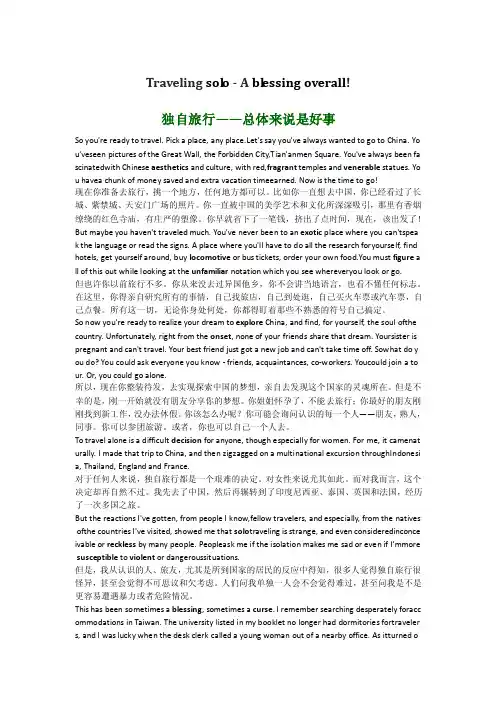
Traveling sol o - A bl essing overall!独自旅行——总体来说是好事So you're ready to travel. Pick a place, any place.Let's say you've always wanted to go to China. Yo u'veseen pictures of the Great Wall, the Forbidden City,Tian'anmen Square. You've always been fa scinatedwith Chinese aesthetics and culture, with red,fragrant temples and venerable statues. Yo u havea chunk of money saved and extra vacation timeearned. Now is the time to go!现在你准备去旅行,挑一个地方,任何地方都可以。
比如你一直想去中国,你已经看过了长城、紫禁城、天安门广场的照片。
你一直被中国的美学艺术和文化所深深吸引,那里有香烟缭绕的红色寺庙,有庄严的塑像。
你早就省下了一笔钱,挤出了点时间,现在,该出发了!But maybe you haven't traveled much. You've never been to an exotic place where you can'tspea k the language or read the signs. A place where you'll have to do all the research foryourself, find hotels, get yourself around, buy locomotive or bus tickets, order your own food.You must figure a ll of this out while looking at the unfamiliar notation which you see whereveryou look or go.但也许你以前旅行不多。
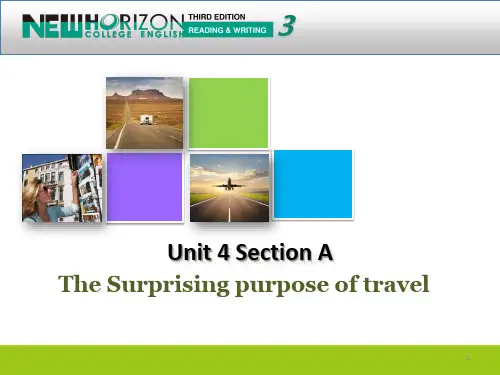
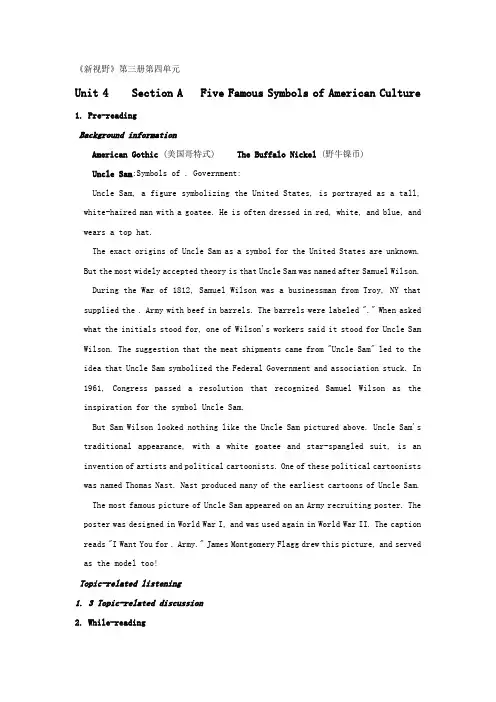
《新视野》第三册第四单元Unit 4 Section A Five Famous Symbols of American Culture 1. Pre-readingBackground informationAmerican Gothic (美国哥特式) The Buffalo Nickel (野牛镍币)Uncle Sam:Symbols of . Government:Uncle Sam, a figure symbolizing the United States, is portrayed as a tall, white-haired man with a goatee. He is often dressed in red, white, and blue, and wears a top hat.The exact origins of Uncle Sam as a symbol for the United States are unknown. But the most widely accepted theory is that Uncle Sam was named after Samuel Wilson.During the War of 1812, Samuel Wilson was a businessman from Troy, NY that supplied the . Army with beef in barrels. The barrels were labeled "." When asked what the initials stood for, one of Wilson's workers said it stood for Uncle Sam Wilson. The suggestion that the meat shipments came from "Uncle Sam" led to the idea that Uncle Sam symbolized the Federal Government and association stuck. In 1961, Congress passed a resolution that recognized Samuel Wilson as the inspiration for the symbol Uncle Sam.But Sam Wilson looked nothing like the Uncle Sam pictured above. Uncle Sam's traditional appearance, with a white goatee and star-spangled suit, is an invention of artists and political cartoonists. One of these political cartoonists was named Thomas Nast. Nast produced many of the earliest cartoons of Uncle Sam.The most famous picture of Uncle Sam appeared on an Army recruiting poster. The poster was designed in World War I, and was used again in World War II. The caption reads "I Want You for . Army." James Montgomery Flagg drew this picture, and served as the model too!Topic-related listening1. 3 Topic-related discussion2. While-readingGlobal reading2.1.1 Understand the major details of the text1) What are the five symbols of the United States? (The Statue of Liberty, Barbie dolls, American Gothic, the Buffalo nickel and Uncle Sam.)2) How popular is Barbie according to the text? (The average American girl owns ten Barbie dolls, and two are sold somewhere in the world every second.)3) How did Wood get the idea of painting American Gothic? (He was inspired by the Gothic window of an old farmhouse.)4) What was the Buffalo nickel produced for?(To honor a pair of connected tragedies from the settlement of the American f rontier―the destruction of the buffalo herds and the American Indians)5) What did the employee say when he was asked about the letters “EA-US”? (US was short for “Uncle Sam” Wilson.)2.1.2 Understand organization of the text1) Main idea of the textThis passage is about five famous symbols of American culture, telling readers their historical backgrounds, origins and relevant stories.2) Text structure analysisPart One (Paras. 1-4) To celebrate US independence and the France-America alliance, a ______ artist created the Statue of Liberty, with his wife’s arm and his mother’s face as models for his creation. (French)Part Two (Paras. 5-10) Barbie originated from a German doll and an American girl, ______, whose parents founded the Mattel Toy Company and made Barbie popular. Barbara and her brother Ken, the human models of Barbie and her boyfriend, had different opinions on the doll. (Barbara)Part Three (Paras. 11-14) Inspired by the Gothic window of ______, Grant Wood produced American Gothic. It was the faces of his dentist and sister in the painting that captured the world’s attention. (an old farmhouse)Part Four (Paras. 15-18) Contrary to the tradition, the image of ___________ actual American Indians were used on two sides of the coin, the Buffalo Nickel, bya famed artist James Earle Fraser. (a buffalo and three)Part Five Paras. 19-22) When Sam Wilson was providing meat to the army in a war, some explained the initial letters “US” as Uncle Sam. It became popular later because of __________. An artist created its portrait in army recruiting posters.(a character in political cartoons)Detailed reading2.2.1 Words and phrases1) assemble (L7) 一般说来, 男孩儿更喜欢组装飞机模型. (In general, boys like to assemble model airplanes better.) (fit together the parts of sth)在工厂里, 机械人常被用来组装诸如汽车之类的机械. (Robots are commonly used in factories to assemble machines such as cars.)2) be named after(L24)我不希望用家庭成员的名字来给我儿子起名, (因为) 他不同凡响. (I don't want my son to be named after someone in the family. He's a unique individual.) (be given a name)该校是按照一个士兵的名字命名的. 60年前他为那个城市的解放献出了自己的生命. (The school was named after a soldier who gave his life for the liberation of the city 60 years ago.)3) exaggerate (L24)咱们不该夸大金钱的重要性. (We should not exaggerate the importance of money.) (make sth seem larger, more important, better or worse than it really is)显然, 人们对这件事的反映被夸大了很多.(Clearly, people’s reaction to the event has been rather exaggerated.)4) universally(L26) 追求个人幸福是举世公认的权利. (It is a universally acknowledged right to pursue personal happiness.) (worldwide; by everyone)毫无疑问, 人们并非普遍认可这种解释. (Without doubt, this explanation is not universally accepted.)5)rise to fame(L35) 他仅靠一本一晚上走红,这本书目前正被人们广为传阅. (He rose /came to fame overnight with just one book that is widely read now.) (become famous)凭借"美国哥特式”这幅画, 格兰特.伍德于1930年迅速成名. (Grant Wood instantlyrose to fame in 1930 with his painting “American Gothic”)6) inspire (L38)咱们的工作就是鼓励那些选民加入到咱们(所从事的)事业中. (Our work is to inspire those voters to join our cause.) (encourage)这篇小说的创作灵感来自他和第一任妻子的关系. (His novel was inspired by his relationship with his first wife.) (give sb a feeling of wanting to do sth good, create a work of art, etc.)7)liberate(L59) 咱们的政府应当尽其所能让咱们的人民脱贫. (Our government must try its best to liberate our people from poverty.) (set sb or sth free)男人应当均等地分担家务, 把女人从厨房里解放出来. (Men should take an equal share in housework so as to liberate women from the kitchen.)8) evolve from (L70) 一些人至今仍不相信人类是从猴子进化而来的. (Some people still do not believe now that man evolved from monkeys.) (develop gradually from)语言缓慢地却又不断地从较旧的形式向新形式演变. (Language slowly but constantly evolves from older forms into new ones.)9) recruit(L73) 你能为音乐协会多招些会员吗? (Can you recruit more members to the music society?) (persuade sb to become a new member of an organization, esp. the army)警方正设法招收更多的黑人警官和亚裔警官. (The police are trying to recruit more black and Asian officers.)2.2.2 Sentence patterns1)原句:His mother could not approve of her son’s affection for a woman she had never met, but Bartholdi went ahead and married his love in 1876. (L. 5)他母亲不同意自己的儿子和一个她没有见过的女子恋爱,但是巴托尔迪不为所动,仍然于1876年和心中所爱结为夫妻。
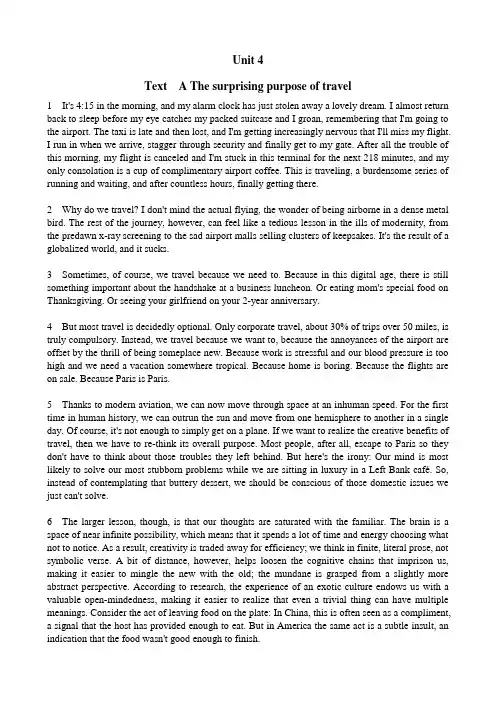
Unit 4Text A The surprising purpose of travel1 It's 4:15 in the morning, and my alarm clock has just stolen away a lovely dream. I almost return back to sleep before my eye catches my packed suitcase and I groan, remembering that I'm going to the airport. The taxi is late and then lost, and I'm getting increasingly nervous that I'll miss my flight.I run in when we arrive, stagger through security and finally get to my gate. After all the trouble of this morning, my flight is canceled and I'm stuck in this terminal for the next 218 minutes, and my only consolation is a cup of complimentary airport coffee. This is traveling, a burdensome series of running and waiting, and after countless hours, finally getting there.2 Why do we travel? I don't mind the actual flying, the wonder of being airborne in a dense metal bird. The rest of the journey, however, can feel like a tedious lesson in the ills of modernity, from the predawn x-ray screening to the sad airport malls selling clusters of keepsakes. It's the result of a globalized world, and it sucks.3 Sometimes, of course, we travel because we need to. Because in this digital age, there is still something important about the handshake at a business luncheon. Or eating mom's special food on Thanksgiving. Or seeing your girlfriend on your 2-year anniversary.4 But most travel is decidedly optional. Only corporate travel, about 30% of trips over 50 miles, is truly compulsory. Instead, we travel because we want to, because the annoyances of the airport are offset by the thrill of being someplace new. Because work is stressful and our blood pressure is too high and we need a vacation somewhere tropical. Because home is boring. Because the flights are on sale. Because Paris is Paris.5 Thanks to modern aviation, we can now move through space at an inhuman speed. For the first time in human history, we can outrun the sun and move from one hemisphere to another in a single day. Of course, it's not enough to simply get on a plane. If we want to realize the creative benefits of travel, then we have to re-think its overall purpose. Most people, after all, escape to Paris so they don't have to think about those troubles they left behind. But here's the irony: Our mind is most likely to solve our most stubborn problems while we are sitting in luxury in a Left Bank café. So, instead of contemplating that buttery dessert, we should be conscious of those domestic issues we just can't solve.6 The larger lesson, though, is that our thoughts are saturated with the familiar. The brain is a space of near infinite possibility, which means that it spends a lot of time and energy choosing what not to notice. As a result, creativity is traded away for efficiency; we think in finite, literal prose, not symbolic verse. A bit of distance, however, helps loosen the cognitive chains that imprison us, making it easier to mingle the new with the old; the mundane is grasped from a slightly more abstract perspective. According to research, the experience of an exotic culture endows us with a valuable open-mindedness, making it easier to realize that even a trivial thing can have multiple meanings. Consider the act of leaving food on the plate: In China, this is often seen as a compliment, a signal that the host has provided enough to eat. But in America the same act is a subtle insult, an7 Such multicultural contrasts mean that seasoned travelers are open to ambiguity, willing to realize that there are decidedly different (and equally valid) ways of interpreting the world. This, in turn, allows them to expand the circumference of their "cognitive inputs" as they refuse to settle for their first answers and initial guesses.8 Of course, this mental flexibility doesn't come from mere distance, a simple change in latitude and longitude. Instead, this renaissance of creativity appears to be a side effect of difference: We need to change cultures, to experience the disorienting diversity of human traditions. The same facets of foreign travel that are so confusing (Do I tip the waiter? Where is this train taking me?) turn out to have a lasting impact, making us more creative because we're less insular. We're reminded of all that we don't know, which is nearly everything; we're surprised by the constant stream of surprises. Even in this globalized age, we can still be amazed at all the earthly things that weren't included in the Let's Go guidebook and that certainly don't exist back home.9 So, let's not pretend that travel doesn't have its drawbacks, or that we endure jet lag for pleasure. We don't spend 10 hours lost in the Louvre because we like it, and the view from the top of Machu Picchu probably doesn't make up for the trouble of lost luggage. (More often than not, I need a vacation after my vacation.) We travel because we need to, because distance and difference are the secret cornerstones of creativity. When we get home, home is still the same. But something in our mind has been changed, and that changes everything.Unit 4Text B Traveling solo — A blessing overall!1 So you're ready to travel. Pick a place, any place. Let's say you've always wanted to go to China. You've seen pictures of the Great Wall, the Forbidden City, Tian'anmen Square. You've always been fascinated with Chinese aesthetics and culture, with red, fragrant temples and venerable statues. You have a chunk of money saved and extra vacation time earned. Now is the time to go!2 But maybe you haven't traveled much. You've never been to an exotic place where you can't speak the language or read the signs. A place where you'll have to do all the research for yourself, find hotels, get yourself around, buy locomotive or bus tickets, order your own food. You must figure all of this out while looking at the unfamiliar notation which you see wherever you look or go.3 So now you're ready to realize your dream to explore China, and find, for yourself, the soul of the country. Unfortunately, right from the onset, none of your friends share that dream. Your sister is pregnant and can't travel. Your best friend just got a new job and can't take time off. So what do you do? You could ask everyone you know — friends, acquaintances, co-workers. You could join a tour. Or, you could go alone.4 To travel alone is a difficult decision for anyone, though especially for women. For me, it came naturally. I made that trip to China, and then zigzagged on a multinational excursion through Indonesia, Thailand, England and France.5 But the reactions I've gotten, from people I know, fellow travelers, and especially, from the natives of the countries I've visited, showed me that solo traveling is strange, and even considered inconceivable or reckless by many people. People ask me if the isolation makes me sad or even if I'm more susceptible to violent or dangerous situations.6 This has been sometimes a blessing, sometimes a curse. I remember searching desperately for accommodations in Taiwan. The university listed in my booklet no longer had dormitories for travelers, and I was lucky when the desk clerk called a young woman out of a nearby office. As it turned out, she was offering to let me stay at her flat and even had a friend come show me around the city the next day.7 Also in Taiwan, I met two girls who smuggled me into their hotel room, gave me one of the beds (they shared the other), and took me to a feast with their tour group. When they heard my next stop was their hometown, they arranged for a bilingual friend to pick me up at the train station.8 But there has also been the downside of those not-so-pleasant experiences. In Indonesia, a cute boy gave me a ride on his motorbike, and thought that gave him license to grope me illicitly. Many times in Indonesia, boys menaced me, assuming I was willing to pay for their company. In Japan, I was picked up by a young man who refused to drop me at my Youth Hostel; he insisted I stay with his friends. The friends turned out to be four girls; I was safe, but one snored like a lawnmower, and it took me two days to escape.9 I've been irritated and perplexed many times — not speaking a language, not understanding or being understood. Once, in Italy, a hotel clerk tried to overcharge me and only gave up after 10 minutes of arguing. Another time in China, a taxi driver insisted I pay more, and I was rescued by the doorman of a fancy hotel.10 Having a companion might have helped safeguard me from some of those problems. But it would have suppressed other opportunities — a long afternoon in Thailand all alone in the back of a hay wagon and then seven days in the back of a truck with a Brit, two Aussies and two Norwegians! Eating ethnic food on my way through eastern Korea with four youthful Japanese salarymen. Getting sick in China, and being nursed with chocolate bars and tissues by a couple from Texas.11 The few times I have traveled with a companion, I haven't had the same ample opportunities to meet people. Other travelers can swap stories with you about the local folklore of the places they've been to and often have credible insights into the place you're visiting. Locals are also more likely to see you as approachable and be upfront with you when you're on your own.12 Of course you have to be careful not to endanger yourself by throwing caution to the wind. Watch your back, but don't presume the worst and be overly fearful. Be friendly with people, but watch out for those who are too friendly with you. Don't disregard your instincts. If you hear stories about criminals on a road, take the road – just don't take much cash, and don't accept Coca Cola from strangers.13 The key to solo travel is to open your mind, close your eyes and leap in! Everything that happens to you is an experience, and good, bad or neutral, they will all benefit you in some way. Take those little annoyances, those inefficiencies, and those boring bureaucrats with a laugh. If you despise something, just remember: You don't live there, you can leave anytime, and you'll never have to deal with this again!14 Don't ever let a lack of companionship constrain you from doing what you really want to do. Once you go solo, you'll be amazed at how sensational your travel experiences will be.。
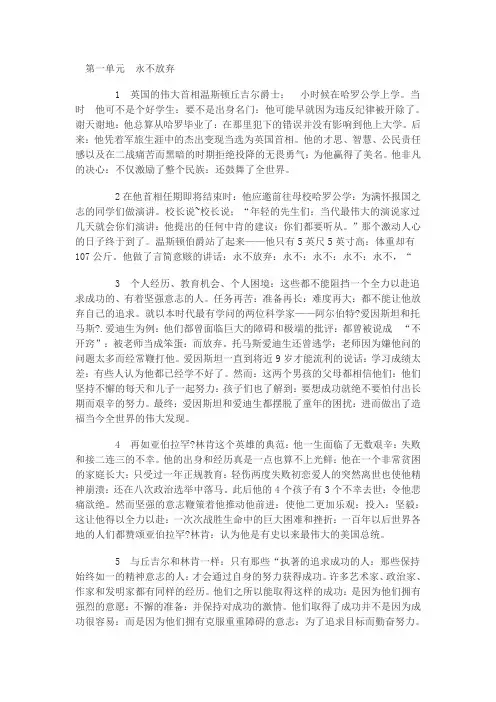
第一单元永不放弃1 英国的伟大首相温斯顿丘吉尔爵士:小时候在哈罗公学上学。
当时他可不是个好学生:要不是出身名门:他可能早就因为违反纪律被开除了。
谢天谢地:他总算从哈罗毕业了:在那里犯下的错误并没有影响到他上大学。
后来:他凭着军旅生涯中的杰出变现当选为英国首相。
他的才思、智慧、公民责任感以及在二战痛苦而黑暗的时期拒绝投降的无畏勇气:为他赢得了美名。
他非凡的决心:不仅激励了整个民族:还鼓舞了全世界。
2在他首相任期即将结束时:他应邀前往母校哈罗公学:为满怀报国之志的同学们做演讲。
校长说~校长说;“年轻的先生们:当代最伟大的演说家过几天就会你们演讲:他提出的任何中肯的建议:你们都要听从。
”那个激动人心的日子终于到了。
温斯顿伯爵站了起来——他只有5英尺5英寸高:体重却有107公斤。
他做了言简意赅的讲话:永不放弃:永不:永不:永不:永不,“3 个人经历、教育机会、个人困境:这些都不能阻挡一个全力以赴追求成功的、有着坚强意志的人。
任务再苦:准备再长:难度再大:都不能让他放弃自己的追求。
就以本时代最有学问的两位科学家——阿尔伯特?爱因斯坦和托马斯?.爱迪生为例:他们都曾面临巨大的障碍和极端的批评:都曾被说成“不开窍”:被老师当成笨蛋:而放弃。
托马斯爱迪生还曾逃学:老师因为嫌他问的问题太多而经常鞭打他。
爱因斯坦一直到将近9岁才能流利的说话:学习成绩太差:有些人认为他都已经学不好了。
然而:这两个男孩的父母都相信他们:他们坚持不懈的每天和儿子一起努力:孩子们也了解到:要想成功就绝不要怕付出长期而艰辛的努力。
最终:爱因斯坦和爱迪生都摆脱了童年的困扰:进而做出了造福当今全世界的伟大发现。
4 再如亚伯拉罕?林肯这个英雄的典范:他一生面临了无数艰辛:失败和接二连三的不幸。
他的出身和经历真是一点也算不上光鲜:他在一个非常贫困的家庭长大:只受过一年正规教育:轻伤两度失败初恋爱人的突然离世也使他精神崩溃:还在八次政治选举中落马。
此后他的4个孩子有3个不幸去世:令他悲痛欲绝。
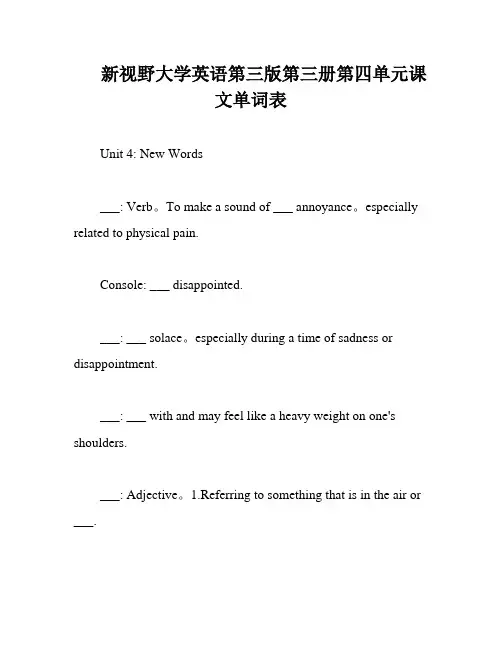
新视野大学英语第三版第三册第四单元课文单词表Unit 4: New Words___: Verb。
To make a sound of ___ annoyance。
especially related to physical pain.Console: ___ disappointed.___: ___ solace。
especially during a time of sadness or disappointment.___: ___ with and may feel like a heavy weight on one's shoulders.___: Adjective。
1.Referring to something that is in the air or ___.___: Adjective。
1.Referring to a substance that has a high mass per unit of volume。
2.Referring to something that is ___.Mall: Noun。
A large shopping center with many ___.___: ___.Globalize: Verb。
1.To make something global or worldwide。
2.To make a business or company operate on a global scale.___: ___ during the middle of the day。
especially with a group of people.Anniversary: Noun。
A day that marks a special event that happened in a us year。
usually ___.Decidedly: ___。

TEXT AThe surprising purpose of travel令人惊奇的旅行目的1 It's 4:15 in the morning, and my alarm clock has just stolen away a lovely dream. I almost return back to sleep before my eye catches my packed suitcase and I groan, remembering that I'm going to the airport. The taxi is late and then lost, and I'm getting increasingly nervous that I'll miss my flight. I run in when we arrive, stagger through security and finally get to my gate. After all the trouble of this morning, my flight is canceled and I'm stuck in this terminal for the next 218 minutes, and my only consolation is a cup of complimentary airport coffee. This is traveling, a burdensome series of running and waiting, and after countless hours, finally getting there.早晨四点一刻,闹钟把我从美梦中惊醒,要不是突然看见早已收拾好的行李箱,我几乎又要睡着。
想起来还要去机场,我叹了口气。
出租车来晚了,并且在途中迷了路,我越来越担心会赶不上飞机。
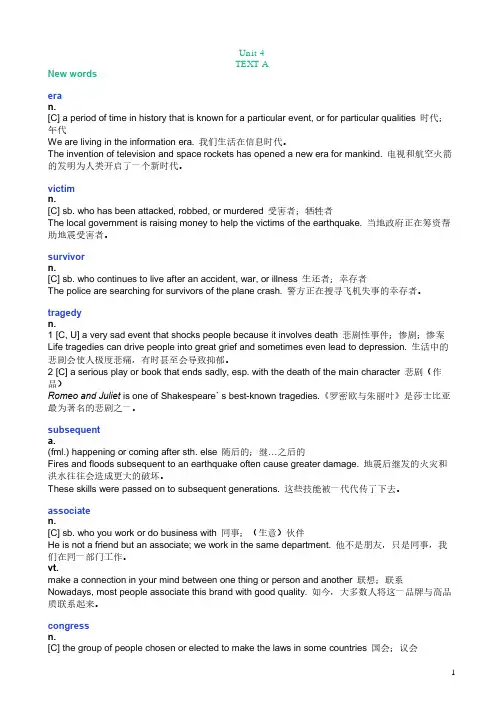
Unit 4TEXT ANew wordseran.[C] a period of time in history that is known for a particular event, or for particular qualities 时代;年代We are living in the information era. 我们生活在信息时代。
The invention of television and space rockets has opened a new era for mankind. 电视和航空火箭的发明为人类开启了一个新时代。
victimn.[C] sb. who has been attacked, robbed, or murdered 受害者;牺牲者The local government is raising money to help the victims of the earthquake. 当地政府正在筹资帮助地震受害者。
survivorn.[C] sb. who continues to live after an accident, war, or illness 生还者;幸存者The police are searching for survivors of the plane crash. 警方正在搜寻飞机失事的幸存者。
tragedyn.1 [C, U] a very sad event that shocks people because it involves death 悲剧性事件;惨剧;惨案Life tragedies can drive people into great grief and sometimes even lead to depression. 生活中的悲剧会使人极度悲痛,有时甚至会导致抑郁。
2 [C] a serious play or book that ends sadly, esp. with the death of the main character 悲剧(作品)Romeo and Juliet is one of Shakespeare’ s best-known tragedies.《罗密欧与朱丽叶》是莎士比亚最为著名的悲剧之一。

TEXT AThe surprising purpose of travel令人惊奇的旅行目的1 It's 4:15 in the morning, and my alarm clock has just stolen away a lovely dream. I almost return back to sleep before my eye catches my packed suitcase and I groan, remembering that I'm going to the airport. The taxi is late and then lost, and I'm getting increasingly nervous that I'll miss my flight. I run in when we arrive, stagger through security and finally get to my gate. After all the trouble of this morning, my flight is canceled and I'm stuck in this terminal for the next 218 minutes, and my only consolation is a cup of complimentary airport coffee. This is traveling, a burdensome series of running and waiting, and after countless hours, finally getting there.早晨四点一刻,闹钟把我从美梦中惊醒,要不是突然看见早已收拾好的行李箱,我几乎又要睡着。
想起来还要去机场,我叹了口气。
出租车来晚了,并且在途中迷了路,我越来越担心会赶不上飞机。
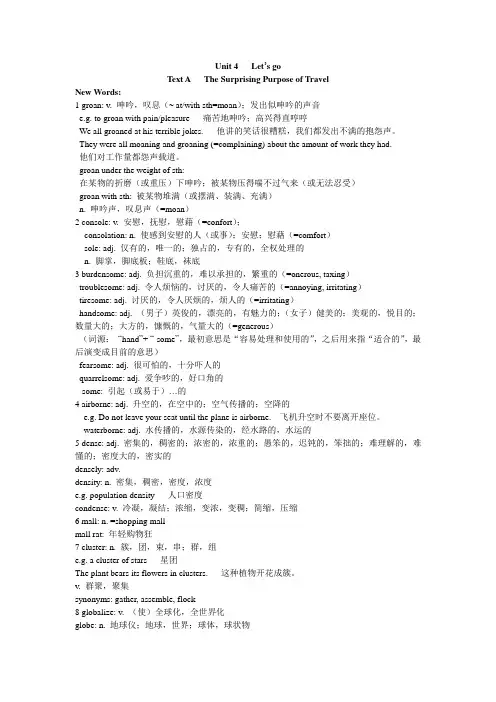
Unit 4 Let’s goText A The Surprising Purpose of TravelNew Words:1 groan: v. 呻吟,叹息(~ at/with sth=moan);发出似呻吟的声音e.g. to groan with pain/pleasure 痛苦地呻吟;高兴得直哼哼We all groaned at his terrible jokes. 他讲的笑话很糟糕,我们都发出不满的抱怨声。
They were all moaning and groaning (=complaining) about the amount of work they had.他们对工作量都怨声载道。
groan under the weight of sth:在某物的折磨(或重压)下呻吟;被某物压得喘不过气来(或无法忍受)groan with sth: 被某物堆满(或摆满、装满、充满)n. 呻吟声,叹息声(=moan)2 console: v. 安慰,抚慰,慰藉(=confort);consolation: n. 使感到安慰的人(或事);安慰;慰藉(=comfort)sole: adj. 仅有的,唯一的;独占的,专有的,全权处理的n. 脚掌,脚底板;鞋底,袜底3 burdensome: adj. 负担沉重的,难以承担的,繁重的(=onerous, taxing)troublesome: adj. 令人烦恼的,讨厌的,令人痛苦的(=annoying, irritating)tiresome: adj. 讨厌的,令人厌烦的,烦人的(=irritating)handsome: adj. (男子)英俊的,漂亮的,有魅力的;(女子)健美的;美观的,悦目的;数量大的;大方的,慷慨的,气量大的(=generous)(词源:“hand”+ “-some”,最初意思是“容易处理和使用的”,之后用来指“适合的”,最后演变成目前的意思)fearsome: adj. 很可怕的,十分吓人的quarrelsome: adj. 爱争吵的,好口角的-some: 引起(或易于)…的4 airborne: adj. 升空的,在空中的;空气传播的;空降的e.g. Do not leave your seat until the plane is airborne. 飞机升空时不要离开座位。
Phrases and ExpressionsProper Namesstatuen・[C] a human or animal image made of wood, stone, bronze, etc. 雕像,塑像They planned to put up a statue for the President.他们计划为总统立一尊雕像。
A statue of Nelson stands at the top of Nelson's Column.纳尔逊的雕像耸立在纳尔逊纪念柱顶端。
libertyn. [U] the freedom and the right to do whatever one wants 自由(权)H undreds of political prisoners are to be given their liberty.成百上千的政治犯将获得自由。
They give women a great deal of liberty.他们给子妇女很多的自由enlightenvt. give sb. information about sth. so that they understand more about it 启发;才旨导I don't understand this paragraph that you've written here. Could you enlighten me?我读不懂你写的这段话。
你能给我讲讲吗?The object of his novel writing is to amuse and enlighten the general readers.,他写小说的目的在于使广大读者得到娱乐并受到教育。
m onumentn. [C] a building, statue, etc. that is built to remind people of a famous person or important event 纪念碑I n the square in front of the hotel stands a monument to all the people killed in the war.在那家旅馆前的广场上矗立着一座纪念战争死难者的纪念碑。
UNIT 4New wordsgroan vi.(因痛苦或烦恼等)呻吟,发出哼哼声v.抱怨n.[C](尤指疼痛或烦恼时的)呻吟,哼哼声console vt.安慰consolation n.[C,U]安慰;慰藉burdensome a.(fml.)令人烦恼的;成为负担的airborne a.1在空中的;飞行中的2空气传播的dense a.1(物质)密度大的2茂密的3(烟雾或气体)浓密的mall n.[C]购物商场cluster n.[C]群;组;束;串;簇v.群集;聚集globalize vt.1使全球化2使(企业)全球化globalized a.全球性的luncheon n.[C,U](fml.)(尤指许多人吃的正式的)午餐anniversary n.[C]纪念日;周年纪念decidedly ad.1确实无疑地;显然2坚决地;果断地corporate a.大公司的;全体的;集体的compulsory a.必须做的;义务的;强制的offset vt.抵消;补偿n.抵消物;补偿tropical a.热带的,来自热带的aviation n.航空;飞行术hemisphere n.地球的半球;大脑半球irony 反语stubborn 顽强的contemplate 打算saturate 使充满saturated 充满的finite 有限的literal 刻板的prose 散文verse 诗cognitive认知的imprison 限制mundane 普通的exotic 别致的endow 赋予trivial 没意思的multicultural 多元文化的ambiguity 不明确circumference周边latitude 纬度longitude 经度renaissance复兴facet 某一方面insular 与世隔绝的drawback 不足jet lag 时差反应cornerstone 基础Phrases and expressionson sale (esp.AmE) 廉价出售的trade...for... 用…交换…;互相交换mingle...with 使…与…混合be open to sth. 愿意考虑…more often than not 往往;多半Proper namesLift Bank (巴黎的)左岸地区(位于塞纳河南岸)Machu Picchu 马丘比丘(南美洲最重要的考古发掘中心,也是秘鲁最受欢迎的旅游景点)。
UNIT 4
New words
groan vi.(因痛苦或烦恼等)呻吟,发出哼哼声v.抱怨n.[C](尤指疼痛或烦恼时的)呻吟,哼哼声
console vt.安慰
consolation n.[C,U]安慰;慰藉
burdensome a.(fml.)令人烦恼的;成为负担的
airborne a.1在空中的;飞行中的2空气传播的
dense a.1(物质)密度大的2茂密的3(烟雾或气体)浓密的
mall n.[C]购物商场
cluster n.[C]群;组;束;串;簇v.群集;聚集
globalize vt.1使全球化2使(企业)全球化
globalized a.全球性的
luncheon n.[C,U](fml.)(尤指许多人吃的正式的)午餐
anniversary n.[C]纪念日;周年纪念
decidedly ad.1确实无疑地;显然2坚决地;果断地
corporate a.大公司的;全体的;集体的
compulsory a.必须做的;义务的;强制的
offset vt.抵消;补偿n.抵消物;补偿
tropical a.热带的,来自热带的
aviation n.航空;飞行术
hemisphere n.地球的半球;大脑半球irony 反语
stubborn 顽强的
contemplate 打算
saturate 使充满
saturated 充满的
finite 有限的
literal 刻板的
prose 散文
verse 诗
cognitive认知的
imprison 限制
mundane 普通的
exotic 别致的
endow 赋予
trivial 没意思的
multicultural 多元文化的
ambiguity 不明确
circumference周边
latitude 纬度
longitude 经度
renaissance复兴
facet 某一方面
insular 与世隔绝的
drawback 不足
jet lag 时差反应
cornerstone 基础
Phrases and expressions
on sale (esp.AmE) 廉价出售的
trade...for... 用…交换…;互相交换
mingle...with 使…与…混合
be open to sth. 愿意考虑…
more often than not 往往;多半
Proper names
Lift Bank (巴黎的)左岸地区(位于塞纳河南岸)
Machu Picchu 马丘比丘(南美洲最重要的考古发掘中心,也是秘鲁最受欢迎的旅游景点)。